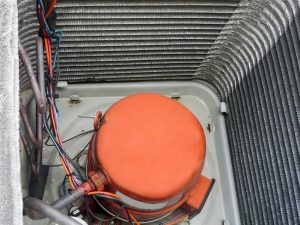We’re pros when it comes to air conditioning repair in Southern Vermont, and we often get calls from concerned homeowners who find their air conditioner has stopped working, only to discover the culprit is a dead compressor. The compressor is a crucial component of an AC system, responsible for circulating refrigerant and maintaining the necessary pressure for heat exchange.
Let’s explore why a dead compressor often requires a complete AC replacement and examine the four main options available when your compressor dies.
Why a Dead Compressor Often Means a Full Replacement
First, it’s essential to understand that a compressor is one of the most expensive parts of an air conditioning unit. Replacing it can be costly, and in many cases, it makes more sense to replace the entire system. Here’s why:
- Cost: The cost of a new compressor, including labor, can be almost as high as a new air conditioning unit.
- Warranty Issues: If your compressor is out of warranty, you’ll be paying out-of-pocket for an expensive part that might fail again.
- System Age and Efficiency: An older system might not be as efficient as newer models, leading to higher energy bills.
- Technological Advancements: Modern AC units are more energy-efficient and offer advanced features not available in older models.
Now, let’s look at the four options available when your compressor dies.
Option 1: Replace Just the Compressor
Replacing just the compressor can be a viable option, particularly if your compressor is still under warranty. Here’s what you need to know:
- Warranty Coverage: If your compressor is under warranty, the cost of the part will be covered, but you’ll likely still have to pay for labor.
- Compatibility: Ensuring that the new compressor is compatible with your existing system is crucial to avoid future issues.
- System Condition: If the rest of your AC system is in good condition and relatively new, replacing just the compressor might extend its lifespan without incurring the cost of a new unit.
While this can be a cost-effective solution, it’s not always the best long-term strategy, especially if your AC unit is old or has other issues.
Option 2: Replace the Outdoor Condenser Unit
Another option is to replace the outdoor condenser unit. This can be cheaper than a full replacement but comes with its own set of challenges.
- Cost: This option is less expensive than replacing the entire system but more costly than just the compressor.
- System Mismatch: There’s a risk of a mismatched system, as the new condenser might not be fully compatible with the indoor components, leading to efficiency problems and potential failures.
- Warranty: Replacing only the condenser usually doesn’t come with a new warranty, leaving you with no protection for future issues.
Given these drawbacks, replacing just the condenser is often not recommended unless the rest of the system is relatively new and in excellent condition.
Option 3: Replace the Outdoor Condenser and the Indoor Evaporator Coil
Replacing both the outdoor condenser and the indoor evaporator coil effectively means installing a new air conditioning system.
- Cost-Efficiency: While this option is more expensive upfront, it can be the most cost-effective in the long run due to improved efficiency and reliability.
- No Mismatch: A new, matched system ensures optimal performance and efficiency, reducing energy bills and the risk of future repairs.
- New Warranty: A full system replacement comes with a new warranty, providing peace of mind and protection against future issues.
This is often the optimal choice when the compressor isn’t under warranty or the existing system is old and inefficient.
Option 4: Replace the Entire HVAC System
If your heater is also old or inefficient, replacing the entire HVAC system, including the heater, can be a smart move.
- Overall Savings: By replacing both systems at once, you can save on labor costs compared to doing the jobs separately.
- Improved Efficiency: Modern HVAC systems are designed to work together, ensuring the highest efficiency and comfort levels.
- Unified Warranty: A single warranty covering both heating and cooling components can simplify maintenance and provide comprehensive protection.
This option is particularly beneficial if your heating system is nearing the end of its lifespan or you want to upgrade to a more energy-efficient model.
Consult the Pros
Deciding what to do when your AC compressor dies isn’t easy, and it’s crucial to consult with HVAC professionals like us at HB Energy Solutions. We can assess your system, discuss your options, and help you make an informed decision that balances cost, efficiency, and long-term reliability.
Contact HB Energy Solutions for all your AC needs. HB Energy Solutions delivers peace of mind.



Join Us Online